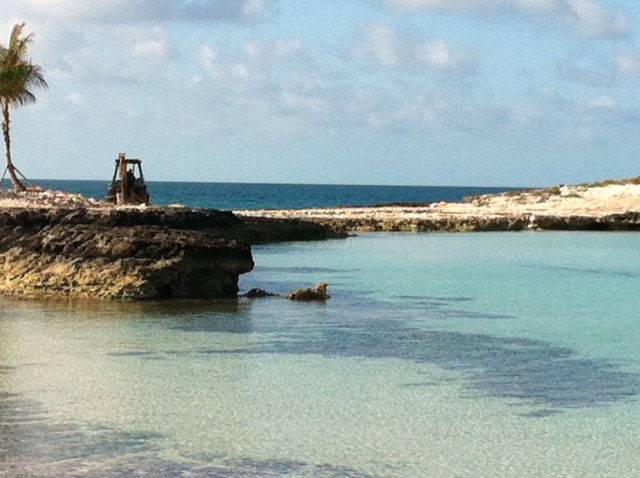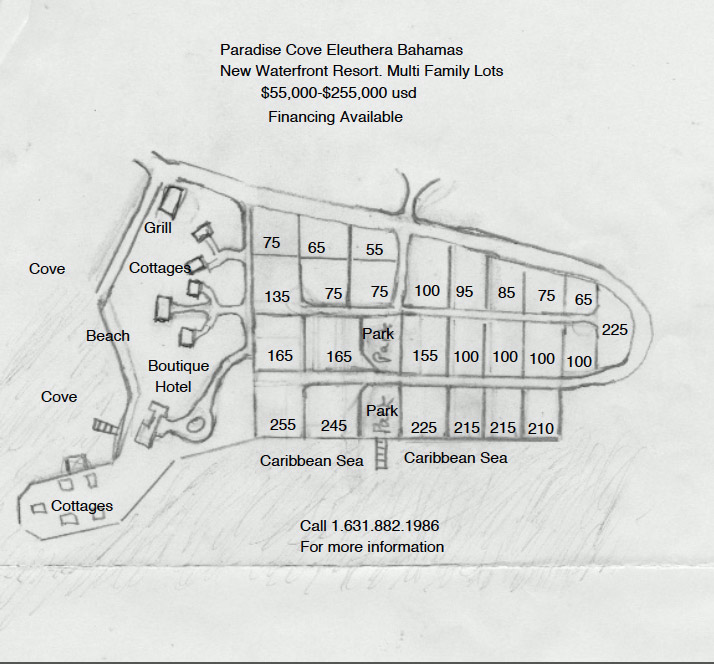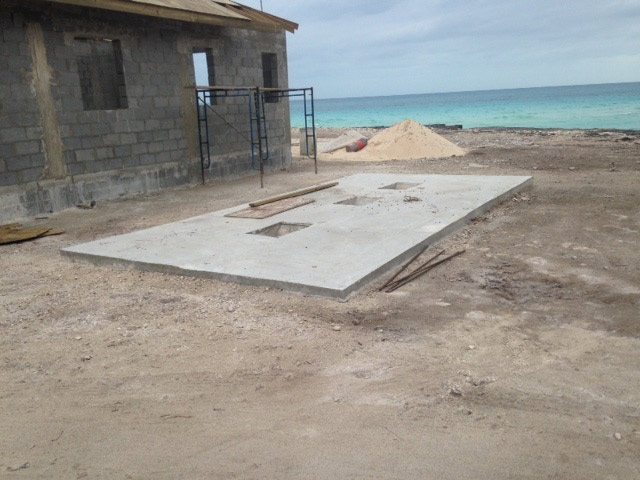|

|
 |
|
Last Updated: Feb 13, 2017 - 1:45:37 AM |

Locals say this tractor is filling in the seabed between Paradise Cove and a nearby rock outcrop, to the severe detriment of the environment.
|
"STB director says lack of public consultation on Rainbow Bay project could tarnish the reputation of one of the country’s top cultural and ecological gems"
(STB Statement) The island of Eleuthera was on track to become a model of sustainable development in The Bahamas but that coveted status may now be at risk thanks to the secrecy surrounding one new project and evidence of extremely worrying construction practices, a prominent activist says.
Sam Duncombe, founder of reEarth and a director of environmental advocacy group Save The Bays (STB), said that recent developments in Rainbow Bay, Eleuthera are just the latest sign that The Bahamas remains “the wild, wild west” when it comes to unregulated development and lack of public consultation.
“Eleuthera is a gem. It is bursting cultural and natural treasures which have been identified and mapped from the northern to southern tip and everywhere in between,” Duncombe said. “With all the existing positive projects in the works, Eleuthera stands poised to become the leader and model for sustainable development throughout The Bahamas.”

Locals say this rough drawing is the only publicly available information about the project.
|
However, she said, the veil of silence over a project known as Paradise Cove constitutes a stain on this growing positive reputation. Meanwhile, she said, locals claim they have seen evidence of serious damage to the marine environment as part of the project.
“As respectful, law abiding citizens and considerate neighbors, Paradise Cove should make the details of this development public for all to see,” Duncombe said.
“The Planning and Subdivisions Act (PSA) calls for thorough consultation with the surrounding community on any proposed project, yet the only concession to this stipulation so far is a single rough drawing, almost totally lacking in details, which has been uploaded to the Paradise Cove Facebook page. This is clearly not good enough.”
Duncombe said Rainbow Bay residents are also anxious because they have seen no evidence that the project has been granted the permits necessary to subdivide the land and effectively create create “a subdivision within a subdivision”.
Over the past few weeks she said, residents have noticed that the seabed between the site of Paradise Cove and an outcrop of rocks is being filled in with sand. If true, this would be extremely destructive to the sensitive and ecologically priceless marine environment, killing the coral reefs beneath the fill and obstructing the south and southeastern tidal flow of sand to the public beach north of the outcrop.

Placing a cesspit so close to the shoreline could lead to raw sewage contaminating the marine environment
|
“Coral reefs are threatened by climate change all over the world; we literally cannot afford to lose any coral,” Duncombe said. “And, with beaches threatened by sea level rise and erosion, obstructing sand flow to any coastline should be avoided at all costs.”
In addition, there are claims that the project has trenched through the community road to connect its water supply without the proper permission, and has even expressed interest in gating off the property – a move that would block the community’s access to a public beach.
There is also concern that a cesspit has been placed a few feet from the seashore.
“During any kind of storm surge this could potentially spill raw sewage into the sea,” Duncombe said. “Why would Town Planning allow the construction of the cesspit so close to the shoreline?
“Surely developments must adhere to setbacks for buildings to prevent further damage to the marine environment and also to avoid removal of the natural shoreline vegetation which plays a vital role in protecting the shoreline from erosion. Not to mention the scarified land that will wash silt into the sea every time the wind blows or the rain falls, smothering corals and sea creatures in the bay.”
Duncombe went on to point out concern over the impact of a seawall being constructed between the property and yet another outcrop of rocks. She added that residents have repeatedly requested to see an environmental impact statement and appropriate approvals for what appear to be extremely worrying construction practices, but have received no response.
“In addition, there has been significant removal of ecologically important trees and shrubs from the shoreline, which have been replaced with coconut trees. Many developers feel these are the symbol of a tropical island, but they do not protect the shoreline from the ravages of erosion like the indigenous flora and fauna.
“This sort of practice will have a huge impact on the kind of country we as Bahamians are able to leave to future generations,” she said.
Duncombe stressed that STB is not against development; a view that has been put forward as a “convenient argument” by the group’s opponents in both government and private development. Rather, she said, the group supports sustainable development and developers who work with communities to minimize the impact on the environment and local culture to the greatest extent possible, fostering mutual respect.
“Successive governments have paid lip service to social and environmental rights and Bahamian ownership of land for decades. Surely by 2016, this should be backed up with some action. Yet our regulators, who have the ultimate responsibility to ensure developers act in accordance to the law, continue to turn a blind eye in the interest of creating more jobs at whatever cost, she said.
“This short term approach is totally misconceived. The fact is, a good national environmental strategy will create many more jobs over the long term while protecting vital natural assets for the benefit of generations to come.”
Duncombe called on the government to inquire into the construction practices at Paradise Cove and mandate the developers hold a public meeting in accordance with the Planning and Subdivisions Act, where all relevant permits and approvals will be made available.

© Copyright 2016 by thebahamasweekly.com
Top of Page
|
|
 |

|
